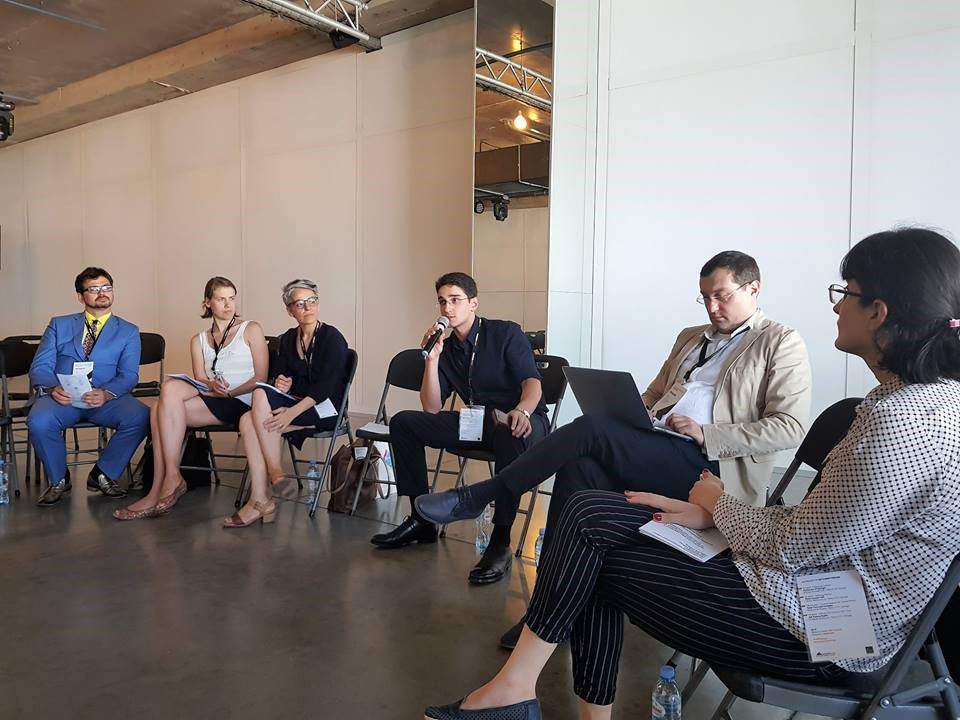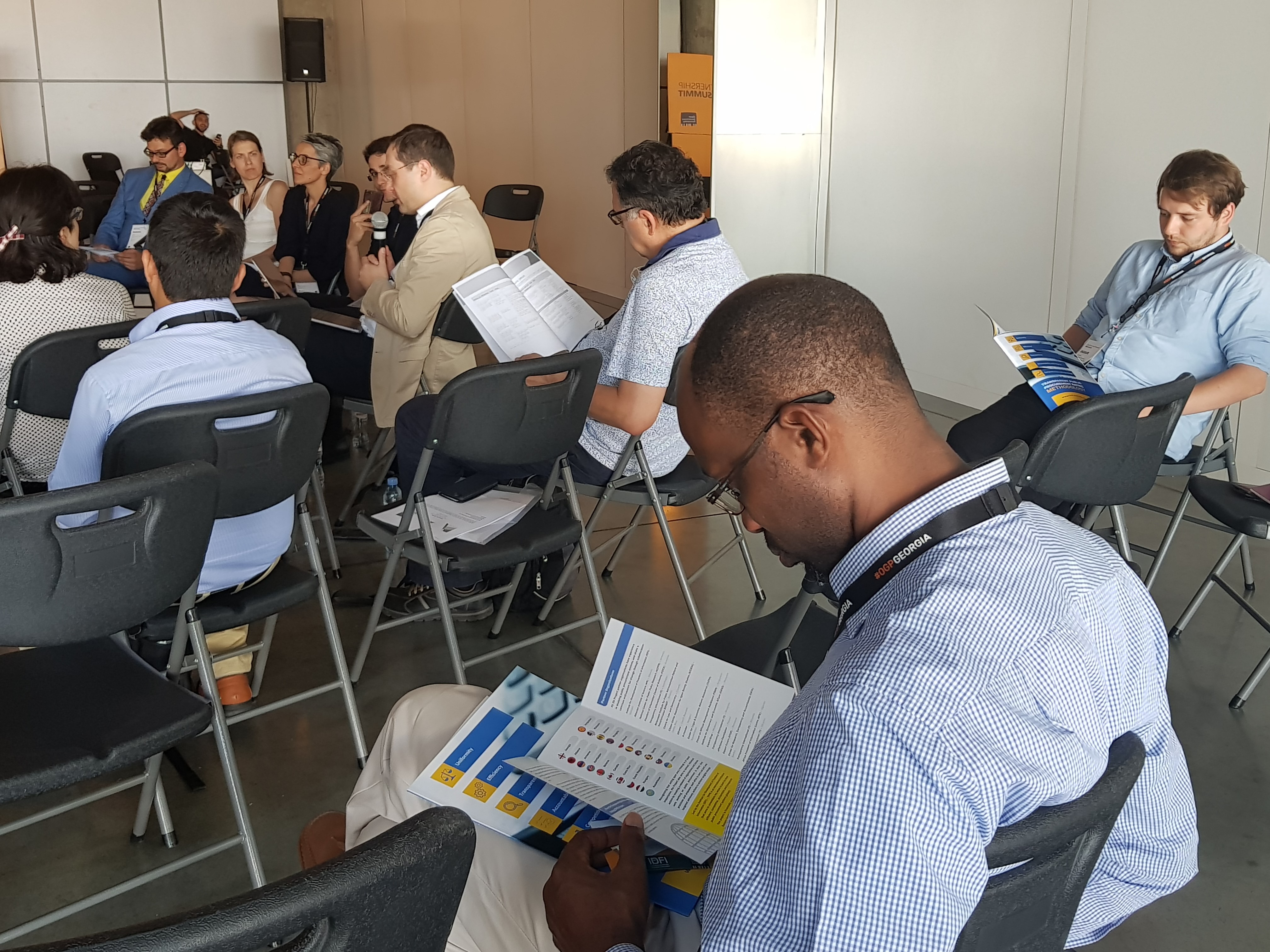


Fishbowl Discussion at the Open Government Partnership Global Summit
 On July 2019, Institute for Development of Freedom of Information (IDFI) organized a fishbowl discussion related to public procurement at the 5th Open Government Partnership (OGP) Global Summit in Tbilisi, Georgia – July 17-18.
On July 2019, Institute for Development of Freedom of Information (IDFI) organized a fishbowl discussion related to public procurement at the 5th Open Government Partnership (OGP) Global Summit in Tbilisi, Georgia – July 17-18.
The main objective of the panel was to lay down a logical chain of public procurement system transformation. The panel gathered reformers and CSOs to share experiences on how public procurement can be transformed into an effective instrument for making governments more accountable, transparent, fair and efficient, which tools can be used in this process and how CSOs and governments can collaborate on enhancing public procurement practices.
Together with partners from the Open Contracting Partnership (OCP), Transparency International – UK, ToDoClub and Open Public Finance of Ukraine, IDFI discussed the importance of data in public procurement, how to make procurement systems more transparent and how to use this information. Interested stakeholders had a chance to learn about the steps taken by the countries that underwent reforms (Georgia, Ukraine and Moldova), how public benefits from open, transparent public procurement systems and learn how to use such tools vis-à-vis other public services, such as healthcare.
David Marghania, Managing Partner of the ToDoClub spoke about the triggers that pushed Georgian and Ukrainian governments to transform the public procurement systems:
“Inefficient public procurement spending, paper-based procurement, corruption and mass arrests of public procurement specialists were a few reasons, which triggered the reform to complete electronic procurement. The willingness of the government to change the situation formed into what is known as the top-down approach to reforming public procurement systems, when the process is led by the government. The electronic procurement system did not solve all the problems, nevertheless, it made procedures simple, information accessible and over the course of 8 years of functioning, Georgia economized around 800 mln USD (approximately 12% of total planned public procurement expenditures over 8 years). In Ukraine, the reform had more of a bottom-up approach, where a new portal was created with the collaboration of CSOs, International Financial Institutions, International experts and other stakeholders. After the system was tested, it was handed over to the government and this case serves as a good model for the bottom-up approach. In Moldova, the experiences of Ukraine and Georgia were used to create yet another contemporary, API based public procurement system with a powerful BI system.”
The benefits of E-contracting and the plans of the Ukrainian government were discussed extensively by Yevgen Kotukh, the Information Security Systems Manager at the Open Public Finance of Ukraine:
“The need for automatization of creating contracts from standard documentation, applying e-signature and have a real-life transmission of contracts to the procurement database is the next step that the Ukrainian government will be working on. Such automatization will reduce many risks connected with public procurement and is the next logical development of the public procurement sphere in Ukraine.”
Sebastiana Etzo, Senior Project Manager at the Transparency International (TI) United Kingdom and Kathrin Frauscher, Deputy Executive Director at the Open Contracting Partnership stressed upon the practical aspects of open data and procurement, where it can be applied and how regular citizens can feel the difference. The main focus was on the healthcare sector, where credible data and information can lead to less inefficiency, better management of resources, improved quality of healthcare and less problems such as shortages of medicine and low quality of service due to inefficient procurement of tools, devices and pharmaceuticals.
“According to the World Health Organization Global Health Expenditure Database, global spending on health in 2012 was $7.2 trillion. A survey conducted several years before, as part of TI’s Global Corruption Report states that an estimated 10% – 25% of global spending on health public procurement was lost to corruption. Therefore, gathering and analyzing data on a wider scale, across countries can aid in identifying cases of mismanagement, corruption and plain inefficiency, which can be used for better healthcare service provision.”
 The audience was also involved during and after the interventions and the value and future of Dynamic Purchasing Systems, e-catalogs and means of engaging more countries in adopting new legislative frameworks for open public procurement systems, such as the Transparent Public Procurement Rating (TPPR) were also discussed.
The audience was also involved during and after the interventions and the value and future of Dynamic Purchasing Systems, e-catalogs and means of engaging more countries in adopting new legislative frameworks for open public procurement systems, such as the Transparent Public Procurement Rating (TPPR) were also discussed.
The OGP is a global initiative that was launched in September 2011 and lists more than 70 participant countries. OGP member states commit to ensuring citizen awareness and engagement in decision-making processes as well as implementing high professional and ethical standards in state services, conducting governance reforms and improving public services by means of innovative technologies.
Georgia was one of the first countries to join the OGP in September 2011. In September 2017, Georgia was elected as Chair of the OGP initiative for a one-year term. As an OGP Chair country, Georgia hosted the 5th OGP Global Summit.